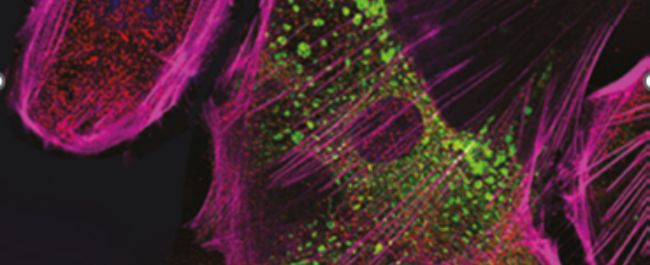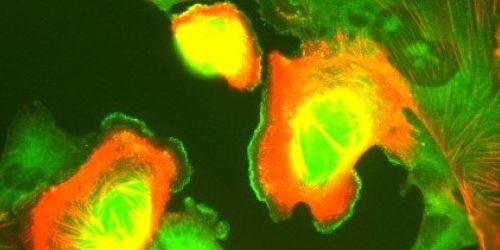Renal Cell Lines

A suite of conditionally immortalised cell lines available for drug discovery research and development.
Uses
- Toxicology studies
- Metabolism
- Therapeutic targeting
- Renal physiology
- R&D Co-culture studies (e.g. 3D culture model)
Benefits
- Primary human cell derived (excluding murine podocyte cell line)
- Physiologically relevant phenotype analogous to in vivo differentiated renal cells.
- Homogenous, stable and long-lasting
- Straightforward, robust protocols for growth and differentiation
- Important adjunct in studies of glomerular cell lines, or for use in co-culture studies
Available packages
- Single cell lines
- Packages of glomerular cells
- Training sessions in cell growth and maintenance
- Expertise in glomerular cell biology
- Model and cell line development (co-culture including 3D models)
- R&D collaborations
The Academic Renal Group at the University of Bristol is a world-leading team of nonclinical and clinical scientists engaged in improving the management, treatment and prevention of renal disease.
Their research focuses on the cellular and molecular biology of glomerular cells and designing and studying potential disease treatments.
To underpin this research a suite of renal cells have been conditionally immortalised. These lines offer ready availability of cells that express normal phenotype and function. The groups’ cells are now widely used in academic and commercial laboratories across the world and provide highly relevant experimental models for the study of drug metabolism, transport, mechanism of action, and nephrotoxicity. The following conditionally immortalised cell lines are available for licensing.
- Human Podocyte
- Murine Podocyte
- Human Glomerular Endothelial
- Human Mesangial
The group has also created a range of conditionally immortalised cell lines from individuals with nephrotic syndrome and other renal diseases. Further details of these are available upon request.
Murine Podocyte Cell Line
The conditionally immortalised murine podocyte cell line allows an in vitro process of maturation analogous to the development and maturation of podocytes in vivo. This cell line is transfected using the same construct used to generate our human-derived cell lines. The result is a homogenous, stable cell source that shows expression of key antigenic markers of differentiated in vivo podocytes. These include the novel podocyte proteins nephrin, podocin, CD2AP and synaptopodin
Human Glomerular Endothelial Cell Line
The human glomerular endothelial cell line (GEnC) is considered to be a gold standard in glomerular filtration research. GEnCs are highly specialised cells that form the inner layer of glomerular capillaries as part of the glomerular microcirculation. They are an essential component in glomerular filtration.
With the damage of GEnCs implicated in diabetic nephropathy, haemolytic uraemic syndrome and preeclampsia, in vitro study of GEnCs is vital to gain an understanding of such diseases. However, as a difficult primary cell to culture, study to date has been limited. The development of a conditionally immortalised GEnC line allows the in vitro differentiation of cells in a similar manner to in vivo, without the onset of early senescence which limits other GEnC lines. This novel, stable, easy-to-culture cell line has key characteristics of GEnCs, including expression of markers such as PECAM1, ICAM2, VEGFR2, vWF, and, uniquely for a cell line, upregulates fenestrations in response to VEGF.
Human Mesangial Cell Line
Mesangial cells form the central structural component of the glomerulus, with mesangial cell injury a characteristic of numerous renal diseases. Consequently, mesangial cells are a key therapeutic target in the treatment of human glomerular disease. Extensively characterised and published, these cells represent the most physiologically relevant model in which to study human glomerular disease in vitro, with the conditionally immortalised nature of the cell line enabling an in vitro process of differentiation equivalent to the in vivo differentiation of mesangial cells. Resulting cells express key mesangial markers including fibronectin, -smooth muscle actin and PDGF -R.
 Professor Moin Saleem
Professor Moin Saleem
Dr. Moin Saleem is a Professor at the University of Bristol and Director of Bristol Renal. He is founder and chief scientific officer of Purespring Therapeutics, the world's first renal gene therapy company.
Dr. Saleem's specific area is podocyte biology. His gene therapy program is focused on targeting the podocyte in order to radically change the treatment of kidney diseases.
Other available technologies
See below for more technologies available technologies developed at the University of Bristol
-
Human Podocyte Cell Line
A conditionally immortalised human podocyte cell line. It is a unique and representative tool for the study of human glomerular disease.
